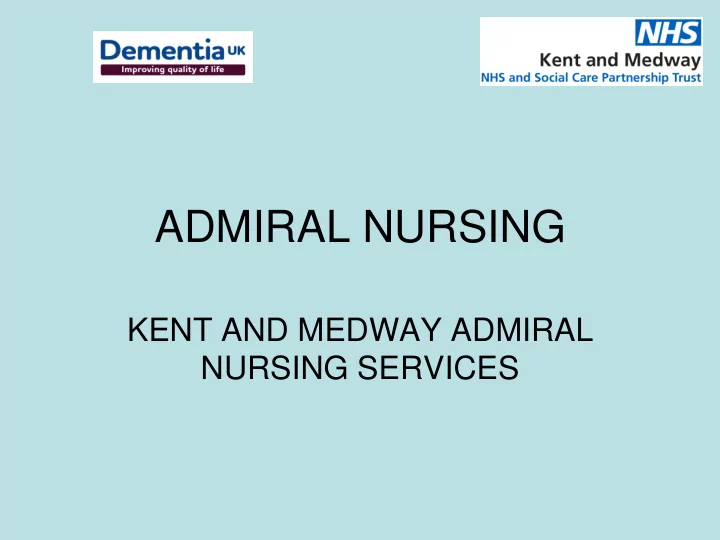

ADMIRAL NURSING KENT AND MEDWAY ADMIRAL NURSING SERVICES
ADMIRAL NURSES • Joseph Levy had dementia and his family first set up the Admiral Nursing service nearly 30 years ago. • The family had needed help and support in caring for Joseph. • Joseph Levy loved sailing and his family nicknamed him ‘Admiral Joe.’ • Hence, Admiral Nurses were born!
ADMIRAL NURSES IN KENT AND MEDWAY ASHFORD (plus support worker) CANTERBURY (plus support worker) DOVER MAIDSTONE MEDWAY SHEPWAY SWALE THANET
WHO ARE ADMIRAL NURSES? • Specialist Dementia Nurses who are qualified RMN’s and – have had at least three years dementia experience prior to coming into post – participate in a programme of training and development facilitated by Dementia UK. Attend monthly Practice Development – work together with families to provide one-to-one support, expert guidance and practical solutions to live more positively with dementia each and every day – based within mainstream services: NHS, care homes, hospices and hospitals – work in partnership with those involved in the care of people with dementia (both public sector, health, social care, voluntary sector)
HOW THE ADMIRAL NURSING SERVICE WORKS • Admiral Nurses have an open referral system – self, GP, Social Services, District Nurses, Age UK, family, CMHSOP, Hospitals, Carer Support • They do not need to be open to any other service • PWD living in our area • Provide interventions from pre-diagnosis, post diagnosis and after person with dementia has died. • Uncapped caseload • Often dip ‘in and out’ of family’s care. • The work is a mix of clinical / consultancy ratio
MODEL OF CARE • Holding • Maintaining • Intensive
REFERRAL CRITERIA • Person needs diagnosis or suspected diagnosis of dementia • Carer needs help obtaining or accepting diagnosis • Carer’s own health is being affected as a direct result of caring • Carer may need help managing conflict between the person with dementia, family and/or professionals • Declined other services and may need support accepting help or looking at other options • Needs help understanding/managing challenging or difficult behaviours/situations • It is the family carer who is out client
WHAT DO ADMIRAL NURSES DO? – Provide a holistic assessment of the family member(s) providing care to the person with dementia (PWD) – provision of emotional, psychosocial and educational support. – provide information about dementia, the diagnosis process, responding to and coping with changing behaviour associated with dementia and the impacts that dementia has on the person and the family – provide advice on medication and the disease processes – offer information, skills training and education – Educate families to manage unpredictable and challenging behaviours – Often a better understanding can reduce the risk of a crisis or carer breakdown. – May prevent other services being inappropriately accessed if carers have a better understanding of behaviours associated with dementia – Provide Health Promotion – ensure carers are looking after their own health, importance of breaks, time to self, regular health checks
WHAT DO ADMIRAL NURSES DO ? – Provide Health Promotion – ensure carers are looking after their own health, both mental and physical, importance of breaks, time to self, regular health checks – Ignoring their own health needs can sometimes lead to depression and or worsened physical health problems – Look at ways of preventing and managing risk – Work with complex and unpredictable family dynamics – Intervene and liaise with other clinical professionals and services on behalf of carers – Dementia awareness for health/social care colleagues and voluntary sector organisations – Admiral Nurses provide a bridge across primary and secondary services – Sitting in secondary care but working with people whose care is in primary care.
CASELOAD STATISTICS/TYPE OF ADMIRAL NURSE WORK Average figures for one month 3% 3% 16% FACE TO FACE CONTACTS TELEPHONE CONTACTS GROUPS CONSULTANCY 78%
MULTI-DISCIPLINARY WORKING residential homes community mental health services schools other specialist nurses hospices GP’s care agencies ADMIRAL NURSES dementia champions social services general hospitals media work higher education voluntary services ambulance service
Diagnosis End of life and after death Living with Dementia Diagnosis Support Family centred holistic care Recognising end of life ● ● ● Education & skill enhancement Pre-diagnosis support ● ● Collaborative working ● Navigation through services Understanding the impact of ● diagnosis Preparing the family as end ● Support with changing of life approaches dementia symptoms Adjustment and adaptation ● ● ● Supporting family and person Advance planning support with Understanding diagnosis ● with dementia’s wishes at prognosis ● Fostering a positive outlook end of life ● Practical, emotional and ● psychological support Signposting Ongoing emotional support ● ● ● Maximising quality of life and Coming to terms with diagnosis keeping things normal Supporting to grieve and ● adapt to loss Supporting changing family ● relationships and dynamics Supporting family to cope and ● move forward Supporting anticipatory grief, working with loss and change
COMMENTS • ‘ Thank you for all your support, kindness and ongoing knowledge which has made this last year a lot easier to cope with’ • ‘I couldn’t have kept him at home if it wasn’t for your help’ • ‘ Your non-judgemental advice, listening skills and simple commons sense, suggestions have been simply amazing’ • ‘ I think that your support enabled me to care for **** far better and probably longer than I would have been able to do without you. We are indeed lucky in having Admiral Nurses in this area’
Thank you for listening Any Questions ?.......
Recommend
More recommend